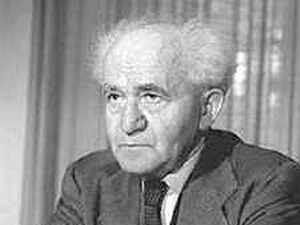A new book examines the views of the country's founding father
By Diti Horowitz-Arad, spokeswoman for Ben Gurion University

"The State of Israel must first of all guarantee two things in the legal field - on which, in my opinion, the existence and future of our country depend: a) the rule of law b) the rule of democracy. The freedom of the individual and the freedom of the people do not depend on the declaration of freedoms, nor on the constitution, ... but on one thing in principle: the rule of law. ... In a country ruled by law, there is a complete separation between the authority of the legislature, which is dedicated to the elected representatives of the people, and between the authority of the judiciary, which is vested in a group of judges who are appointed, but are independent after being appointed by the executive government, a group of judges who are familiar with the law and are loyal to it."
No, this is not a quote from a speech given these days in Israel, but words written by David Ben-Gurion more than seventy years ago and are cited in a new book, 'The Political Thought of David Ben-Gurion', edited by Prof. Avi Barali and Dr. Gilat Gofer, published by Ben-Gurion Institute, Ben-Gurion University of the Negev, in collaboration with the Ben-Gurion Heritage Institute.
The state is not an end in itself, stated Ben-Gurion, but an essential tool for the fulfillment of first and foremost purposes, such as freedom, equality and nurturing the lives of human beings. But what is the meaning of these purposes? And what actions are derived from this world view? The book 'David Ben-Gurion's Political Thought' offers its readers to revisit questions whose vitality and validity have not expired even at the 75th birthday of the State of Israel, and to examine them from the points of view of the country's founding father.
The book contains 27 articles written by the first prime minister, throughout his public life, which reflect his political thought and his thoughts on issues that preoccupy Israeli society to this day. for example:
- You will read about three of the foundations of his political thought: activism and dynamism, unity of action in the midst of plurality and the pursuit of justice in the article 'The Commandment of the Jewish Revolution'.
- In the article 'The State and the Party' you will look at his reasons: the call to change the election system in Israel from a national=relative to a regional=majoritarian system.
- The article "To find out the origin of the segments" is a key document for deciphering the position of origin that characterized Ben-Gurion's attitude towards the Arabs in the Land of Israel at the beginning of his political career.
- In 'Letters to Amos' he formulated his complex position on the issue of dividing the Land of Israel into two states, Jewish and Arab.
- As the leader of the Labor Union in the XNUMXs, he clearly articulated the roots of the concept of the Zionist labor movement in the article 'The National Mission of the Working Class'.
- In 'Following a Bee', Ben-Gurion discusses a comprehensive discussion about the place of women in society in general and in the Zionist movement in particular. This is a speech delivered at the end of an officer's course at the Tsarifin camp, in preparation for discussions that began the next day in the Knesset on the recruitment of women into the army, including the recruitment of religious women.
- "The Meaning of the Negev" is a key article for understanding the place of the Negev in Ben-Gurion's view, in which he emphasized the challenge of life in the Negev and science as a central tool for the development of the Negev for the welfare of Israel and other desert countries.
"Ben-Gurion's thought was shaped by branching political activity from his youth and by extensive and continuous reading throughout his life," explains Prof. Avi Barali, historian and co-editor of the book. "We have chosen for contemporary readers articles that will emphasize the meaning of the book for the current period and deal with its political, social, economic and cultural views over the years. They all correspond to issues on the agenda of all of us - equality, freedom, governance, the electoral system, right and left and even the High Court of Justice."
"The very fact that Ben-Gurion was a founding leader of the State of Israel, responsible for casting a foundation for society and the state, makes his writing interesting and important even today. Since Israel and Ben-Gurion are intertwined, those who are interested in Israel are also interested in him," the historian noted Dr. Gilat Gopher, the editor of the book and added: "Ben-Gurion belonged to a generation of writing leaders. He writes a lot and even publishes a lot. He wrote for most of his life, and the breadth of his writing is expressed not only in time and quantity, but also in its subjects. In such a space, it is easy to find issues that have occupied Israeli society since then and up to the present day from different points of view."
More of the topic in Hayadan:
